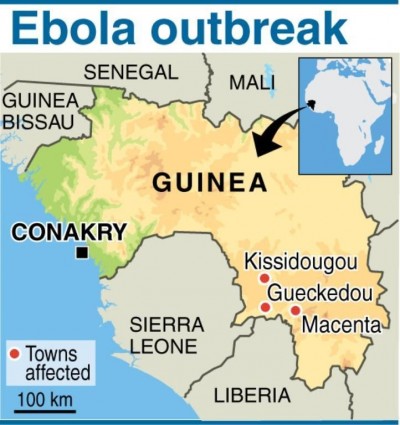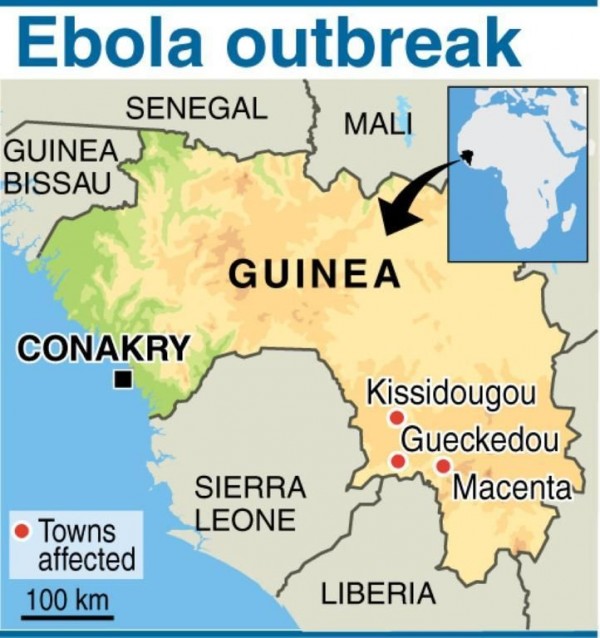 The director-general of the World Health Organization warned Friday that the Ebola outbreak in West Africa is spreading quickly and the consequences could be “catastrophic” if greater efforts to control the outbreak aren’t put into place now.
The director-general of the World Health Organization warned Friday that the Ebola outbreak in West Africa is spreading quickly and the consequences could be “catastrophic” if greater efforts to control the outbreak aren’t put into place now.
“This outbreak is moving faster than our efforts to control it,” Director-General Margaret Chan told the presidents of Guinea, Liberia, Sierra Leone, and Ivory Coast at a gathering in Conakry, the capital of Guinea.
“If the situation continues to deteriorate, the consequences can be catastrophic in terms of lost lives but also severe socioeconomic disruption and a high risk of spread to other countries,” she said.
The world’s largest Ebola outbreak is in its fifth month and escalating in a poor corner of West Africa. Guinea, Sierra Leone and Liberia have together reported 1,323 cases, of whom 729 people have died. Neighboring Ivory Coast is at risk if the outbreak isn’t tamed.
Also Friday, French authorities recommended for a second day that nationals suspend all travel to West African countries where cases of Ebola have been identified in a bid to prevent spread of the deadly disease to France.
The WHO’s Dr. Chan praised the leaders gathered for their concern and political commitment—demonstrated this week with new measures such as deploying soldiers to quarantine stricken neighborhoods in Sierra Leone.
But, she said, “This meeting must mark a turning point in the outbreak response.”
The dead include more than 60 health-care workers, she said, and other health-care staff have been infected. They include two Americans who are now believed to be under evacuation to the U.S. for intensive care.
Dr. Chan said: “This is an unprecedented outbreak accompanied by unprecedented challenges.” Among them is the fact that it is caused by the most lethal Ebola strain.
“Chains of transmission have moved underground. They are invisible. They are not being reported,” she said, “Because of the high fatality rate, many people in affected areas associate isolation wards with a sure death sentence, and prefer to care for loved ones in homes or seek assistance from traditional healers,” she said.
“Such hiding of cases defeats strategies for rapid containment. Moreover, public attitudes can create a security threat to response teams when fear and misunderstanding turn to anger, hostility, or violence,” she said.
However, she said that Ebola can be stopped with a well-managed response. She said that she would lead an international response coordinated by the WHO. Yesterday the organization said that it was launching such an effort with its member states that would cost $100 million.
The demands created by the outbreak in West Africa “outstrip your capacities to respond,” she told the four presidents.
“The situation in West Africa is of international concern and must receive urgent priority for decisive action at national and international levels,” she said.
Meanwhile, the French Foreign Ministry warned that travel to Liberia, Guinea, Sierra Leone and Nigeria should be suspended unless absolutely necessary.
French citizens who travel to the area should avoid going to the jungles of Guinea and the areas identified in Sierra Leone and Liberia, the ministry said, adding people shouldn’t consume or manipulate meat from jungle animals and should avoid direct contact with body fluids from people suffering from high fever.
When returning to France, people traveling from the four African countries should contact immediately emergency health services if they show symptoms such as fever.
Lebanon taking precautions
With 20,000 citizens living in three countries affected by an Ebola outbreak, Lebanon is taking a series of measures to prevent the virus reaching its shores, government officials said Friday.
Health Minister Wael Abu Faour, during a tour of Beirut airport, said the ministry “has asked all airlines, particularly those bringing people from Sierra Leone, Guinea and Liberia, to inform Lebanese authorities about anyone displaying suspicious symptoms.”
Any traveller with such symptoms would be turned over for assessment to an 18-person team of doctors and nurses posted at the airport.
The foreign ministry, meanwhile, called on Lebanese embassies to ensure that citizens abroad were kept informed of the outbreak, taking appropriate precautions and being given assistance if they wanted to return home.
Nearly 12,000 Lebanese citizens live in Sierra Leone, with another 6,500 in Liberia and 3,500 in Guinea, the three African nations worst affected by the Ebola outbreak that has killed nearly 730 people so far.
For its part, the labour ministry said Friday it has suspended the delivery of work permits to residents of the three countries.
“As a result of fears about public health and to prevent an Ebola epidemic, the labour ministry is no longer receiving work permit requests from residents of Sierra Leone, Guinea and Liberia,” it said.
An official at the ministry said the number of workers affected was limited and the decision was “a precautionary measure”.
WSJ/AFP


Leave a Reply
You must be logged in to post a comment.